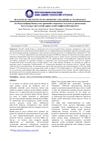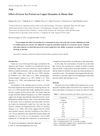 7 citations,
December 2018 in “Journal of Cosmetic Dermatology”
7 citations,
December 2018 in “Journal of Cosmetic Dermatology” Eating vegetarian, having allergies, and family history might be linked to getting gray hair early.
 5 citations,
July 2017 in “Women & Health”
5 citations,
July 2017 in “Women & Health” Nursing women in the West Bank with higher income and non-smoking habits have higher blood zinc levels.
 1 citations,
September 2015 in “Clinics in Dermatology”
1 citations,
September 2015 in “Clinics in Dermatology” The guide helps doctors diagnose hair problems by suggesting a thorough patient history, physical exams, and various diagnostic tools.
 1 citations,
January 2013 in “Springer eBooks”
1 citations,
January 2013 in “Springer eBooks” The document concludes that skin and nail changes can indicate various underlying health conditions.
 May 2024 in “Journal of drug delivery and therapeutics”
May 2024 in “Journal of drug delivery and therapeutics” Women with PCOS have higher oxidative stress and hormone imbalances, suggesting managing oxidative stress could help.
 January 2022 in “Acta dermatovenerologica Alpina, Pannonica et Adriatica (Tiskana izd.)”
January 2022 in “Acta dermatovenerologica Alpina, Pannonica et Adriatica (Tiskana izd.)” Uncombable hair syndrome causes frizzy hair and can affect the nervous system, eyes, and ears, often co-occurring with other hair, skin, nail, and teeth conditions, and is linked to three specific gene mutations.
 January 2011 in “Springer eBooks”
January 2011 in “Springer eBooks” Eating a balanced diet with the right vitamins and minerals is important for healthy hair, but too many supplements can be harmful.
 25 citations,
January 2017 in “International Journal of Trichology”
25 citations,
January 2017 in “International Journal of Trichology” Most Indian people with hair loss in the study lacked nutrients, especially iron.
January 2015 in “Nasza Dermatologia Online” Monilethrix causes fragile, patchy hair loss.
 2 citations,
September 2021 in “Human Psychopharmacology: Clinical and Experimental”
2 citations,
September 2021 in “Human Psychopharmacology: Clinical and Experimental” Valproate can cause hair problems, but there are ways to manage them.
46 citations,
December 2014 in “Epilepsy & behavior” Some antiepileptic drugs can cause weight gain and hair loss, especially in women.
9 citations,
August 2021 in “Journal of clinical medicine” Pili torti is a rare condition where hair is twisted and breaks easily, often linked to genetic disorders or other health issues.
 February 2024 in “ACS Omega”
February 2024 in “ACS Omega” The Shen Bai Hair Growing Decoction may help treat hair loss by promoting hair growth and reducing inflammation.
19 citations,
July 2004 in “Journal of Medical Primatology” Infant baboons suffered from zinc poisoning due to poor cage conditions.
 December 2022 in “Himi, himijn tehnologijn hùrèèlèngijn èrdèm šinžilgèènij bùtèèl”
December 2022 in “Himi, himijn tehnologijn hùrèèlèngijn èrdèm šinžilgèènij bùtèèl” Hair products with copper and zinc enriched yeast made hair thicker and denser.
Dr. SKS Hair Booster Serum is safe and effective for reducing hair fall and promoting hair growth.
 2 citations,
August 2021 in “Journal of Clinical Psychopharmacology”
2 citations,
August 2021 in “Journal of Clinical Psychopharmacology” An 8-year-old girl's eyebrow hair loss was linked to atomoxetine for ADHD but grew back after stopping the medication.
 1 citations,
November 2011 in “Dermatologica Sinica”
1 citations,
November 2011 in “Dermatologica Sinica” Women using hair relaxers with alopecia had lower zinc levels, suggesting zinc deficiency might contribute to hair loss.
 July 2018 in “Journal of College of Medical Sciences-nepal”
July 2018 in “Journal of College of Medical Sciences-nepal” Women with certain types of hair loss may have low iron levels.
4 citations,
January 2020 in “Skin appendage disorders” Toxic metals can cause hair loss and should be considered by doctors.
 January 2023 in “Journal of Ravishankar University”
January 2023 in “Journal of Ravishankar University” Hair loss can be caused by stress, aging, and harmful substances that create an imbalance in the body's natural processes.
1 citations,
September 2020 in “The Indian journal of veterinary sciences and biotechnology” Mange in camels causes blood and organ damage, especially in older females.
 11 citations,
February 2019 in “Journal of Cosmetic Dermatology”
11 citations,
February 2019 in “Journal of Cosmetic Dermatology” Low zinc and biotin levels linked to male hair loss; supplements may help.
 June 2024 in “Archives of dermatological research”
June 2024 in “Archives of dermatological research” Dietary supplements might help prevent post-COVID hair loss, but serum ferritin is not a reliable indicator.
 January 2013 in “Food science and technology research”
January 2013 in “Food science and technology research” Green tea extract may increase copper levels in mouse hair without affecting liver copper.
15 citations,
January 2018 in “Indian Journal of Dermatology” Women with androgenetic alopecia have lower zinc and iron levels.
1 citations,
January 2016 in “American Journal of Clinical and Experimental Medicine” Men with androgenic alopecia have different hair copper levels than those without.
 October 2023 in “Acta dermato-venereologica (Print)”
October 2023 in “Acta dermato-venereologica (Print)” People with severe hair loss have lower zinc levels in their blood.
January 2019 in “Türkiye klinikleri dermatoloji dergisi” Low levels of iron, ferritin, zinc, and folic acid may contribute to hair loss in women.
 March 2024 in “International journal of research in medical sciences”
March 2024 in “International journal of research in medical sciences” Dr. SKS hair booster serum effectively treats hair loss caused by COVID-19.




















